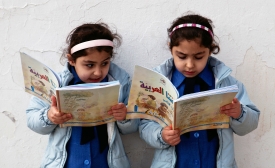state department
A year after the State Department opened a data center in the Middle East aimed at countering Islamic State’s online messaging, the U.S. plans to inaugurate a similar outpost in Malaysia in coming months. Like its counterpart in the United Arab Emirates, the new center will seek to undermine the terrorist group’s digital recruitment and propaganda efforts
In an earlier post, I speculated that preventing a Zika virus epidemic would rally transnational diaspora organizations. Since then, concern has grown among U.S.- and Canadian-based diasporans, especially those with roots in Brazil, Puerto Rico, the Dominican Republic, Haiti, and other Latin American countries. Caribbean American and global media are featuring stories and public service announcements on the outbreak, but so far, I have observed no major non-governmental diasporan response.

Philip Seib breaks down the U.S. State Department's latest report.
The Gay Men’s Chorus of Washington has sent its small ensemble, Potomac Fever, on a State Department-sponsored diplomacy tour to promote LGBTQ rights in Ukraine. This tour came about due to the success of our Cuba concert tour last summer. Earlier this year, the U.S. Embassy in Ukraine called us up and said they loved what we did in Cuba, and would like us to bring that kind of diplomacy to Ukraine — a country that is deeply in need of unity on LGBTQ and other issues.
Some conventional public diplomacy measures are not suitable for countering violent extremism (CVE) because they are mismatched against extremists’ more aggressive tactics. But this week, the U.S. State Department has taken a significant step forward by announcing that it will place greater emphasis on development aid in its CVE efforts. A joint strategy that will better coordinate State Department CVE projects with USAID should bring new substance to public diplomacy that has CVE potential.







